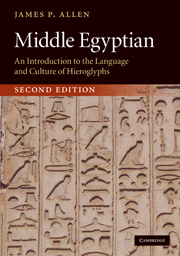Book contents
- Frontmatter
- Contents
- List of Figures
- Preface
- Lesson 1 Egyptian Language and Writing
- Lesson 2 The Sounds of Middle Egyptian
- Lesson 3 Multiliteral Signs
- Lesson 4 Nouns
- Lesson 5 Pronouns
- Lesson 6 Adjectives
- Lesson 7 Adjectival and Nominal Sentences
- Lesson 8 Prepositions and Adverbs
- Lesson 9 Numbers
- Lesson 10 Adverbial Sentences
- Lesson 11 Nonverbal Sentences
- Lesson 12 Nonverbal Clauses
- Lesson 13 Verbs
- Lesson 14 The Infinitival Forms
- Lesson 15 The Pseudoverbal Construction
- Lesson 16 The Imperative and Particles
- Lesson 17 The Stative
- Lesson 18 The Perfect
- Lesson 19 The Subjunctive
- Lesson 20 The Perfective and Imperfective
- Lesson 21 The Prospective and Passive
- Lesson 22 The Other Forms of the Suffix Conjugation
- Lesson 23 The Participles
- Lesson 24 The Relative Forms
- Lesson 25 Special Uses of the Relative Forms
- Lesson 26 Middle Egyptian Grammar
- Sign List
- Dictionary
- Answers to the Exercises
- Index
Lesson 11 - Nonverbal Sentences
- Frontmatter
- Contents
- List of Figures
- Preface
- Lesson 1 Egyptian Language and Writing
- Lesson 2 The Sounds of Middle Egyptian
- Lesson 3 Multiliteral Signs
- Lesson 4 Nouns
- Lesson 5 Pronouns
- Lesson 6 Adjectives
- Lesson 7 Adjectival and Nominal Sentences
- Lesson 8 Prepositions and Adverbs
- Lesson 9 Numbers
- Lesson 10 Adverbial Sentences
- Lesson 11 Nonverbal Sentences
- Lesson 12 Nonverbal Clauses
- Lesson 13 Verbs
- Lesson 14 The Infinitival Forms
- Lesson 15 The Pseudoverbal Construction
- Lesson 16 The Imperative and Particles
- Lesson 17 The Stative
- Lesson 18 The Perfect
- Lesson 19 The Subjunctive
- Lesson 20 The Perfective and Imperfective
- Lesson 21 The Prospective and Passive
- Lesson 22 The Other Forms of the Suffix Conjugation
- Lesson 23 The Participles
- Lesson 24 The Relative Forms
- Lesson 25 Special Uses of the Relative Forms
- Lesson 26 Middle Egyptian Grammar
- Sign List
- Dictionary
- Answers to the Exercises
- Index
Summary
Definitions
Lessons 7 and 10 introduced us to three kinds of Egyptian sentence: those in which the predicate is adjectival, nominal, or adverbial. In each of these sentence-types the predicate is not a verb, although English forces us to translate them with one, usually a form of the verb be. Because of this common feature Egyptologists group the three kinds of sentence together under the heading of “nonverbal sentences,” which is short for the more accurate designation “sentences with a nonverbal predicate” (see § 7.1). In this lesson we will look at the three kinds of nonverbal sentences together, and at some further features of them.
Basic patterns and meanings
As we have seen, each of the three kinds of nonverbal sentence can have many different forms, depending on what is used as the subject and predicate. In general, however, each type has a basic pattern and meaning:
Adjectival sentences have the normal pattern predicate–subject, where the predicate is an adjective (always masculine singular or masculine dual). They express a quality of their subject: for example, nfr sdm “Listening is good,” where the predicate nfr describes a quality of the subject, sdm “listening” (infinitive)—namely, that it is “good.”
Nominal sentences have two basic patterns: A B and A pw B, where either A or B can be the subject or predicate. They express the identity of their subject: rʿ pw “He is Re” (where the predicate rʿ tells who the subject, pw “he,” is); phrt pw ʿnh “Life is a cycle” (where the predicate phrt “a cycle” explains what the subject, ʿnh “life,” is).
- Type
- Chapter
- Information
- Middle EgyptianAn Introduction to the Language and Culture of Hieroglyphs, pp. 123 - 132Publisher: Cambridge University PressPrint publication year: 2010



